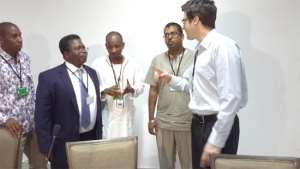
A tax policy advisor at the Ministry of Finance and Economic Planning, Dr Edward Larbi Siaw, has criticised the situation in which only a few Ghanaians honour their tax obligations.
“We cannot continue to deal with a population of 25 million and collect taxes from only two million out of the six million eligible taxpayers,” he stated.
Describing the situation as “not tax justice”, Dr Siaw said it was unfair to increase tax rates for those in the tax net, while other eligible taxpayers walked freely without any attempt to bring them into the tax net. Conference on tax
Dr Siaw was speaking at an international conference jointly organised by OXFAM International and the International Tax Compact and Tax Justice Network, Africa in Accra.
The five-day conference has brought together international organisations, civil society organisations (CSOs) and policy makers from about 15 countries to discuss the challenges and opportunities of fair taxation.
Studies by OXFAM in 2011 indicated that improving tax collection could potentially raise $269 billion annually, which would be sufficient to cover 60 per cent of the financing requirement for achieving the Millennium Development Goals (MDGs). Reduce borrowing
As a lower middle-income country, Dr Siaw said, Ghana could no longer borrow under concessional rates for longer periods, while grants and aids from foreign partners continued to reduce.
The way out, he said, was to ensure that everyone paid tax for equity, adding that it was the best way to sustain the financing of development and end aid dependency.
He said the Ghana Revenue Authority (GRA) had introduced innovative tax polices, including a unit to conduct special audits to detect transfer price abuses and measures to reduce the overall impact of tax exemptions. The challenges
For his part, the Deputy Campaign Manager of OXFAM, Mr Stephen Hale, said many developing countries faced challenges in their efforts at mobilising domestic resources due to factors such as administration, regressive tax regimes, wide range of corporate tax incentives and insufficient use of capital taxes.
“Taxes make countries less dependent on foreign aid, foreign direct investments and loans and they offer avenues for more equitable distribution of wealth and services,” he stated.




 Dumsor: Mathew Opoku Prempeh has been disrespectful, he should be fired – IES
Dumsor: Mathew Opoku Prempeh has been disrespectful, he should be fired – IES
 NPP prioritizing politics over power crisis solution — PR Strategist
NPP prioritizing politics over power crisis solution — PR Strategist
 E/R: Gory accidents kills 3 persons at Aseseaso, several others critically injur...
E/R: Gory accidents kills 3 persons at Aseseaso, several others critically injur...
 Nobody can come up with 'dumsor' timetable except Energy Minister – Osafo-Maafo
Nobody can come up with 'dumsor' timetable except Energy Minister – Osafo-Maafo
 Dumsor: You ‘the men’ find it difficult to draw timetable when ‘incompetent’ NDC...
Dumsor: You ‘the men’ find it difficult to draw timetable when ‘incompetent’ NDC...
 We’re working to restore supply after heavy rains caused outages in parts of Gre...
We’re working to restore supply after heavy rains caused outages in parts of Gre...
 NPP government plans to expand rail network to every region — Peter Amewu
NPP government plans to expand rail network to every region — Peter Amewu
 Dumsor must stop vigil part 2: We’ll choose how we demonstrate and who to partne...
Dumsor must stop vigil part 2: We’ll choose how we demonstrate and who to partne...
 2024 elections: NDC stands on the side of morality, truth; NPP isn't an option —...
2024 elections: NDC stands on the side of morality, truth; NPP isn't an option —...
 Akufo-Addo has moved Ghana from 'Beyond Aid' to ‘Beyond Borrowing’ — Haruna Idri...
Akufo-Addo has moved Ghana from 'Beyond Aid' to ‘Beyond Borrowing’ — Haruna Idri...
